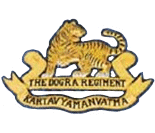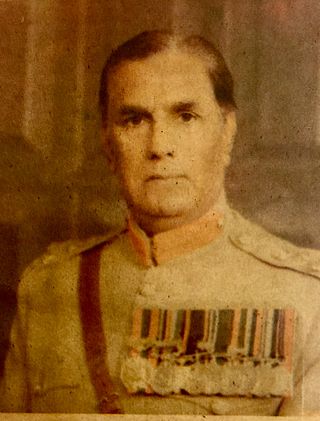Brig. Pritam Singh is an Indian Army Officer, born in Dina Village in Ferozpur, Punjab, India. He fought in the Battle of Singapore in 1942. After the war, he was promoted to Lt. Colonel. In 1947, he fought against Pakistan in Poonch. [1]
Brig. Pritam Singh is an Indian Army Officer, born in Dina Village in Ferozpur, Punjab, India. He fought in the Battle of Singapore in 1942. After the war, he was promoted to Lt. Colonel. In 1947, he fought against Pakistan in Poonch. [1]

As a young officer, Pritam Singh fought in the Battle of Singapore in 1942 and was wounded badly. He was imprisoned by the enemy, but escaped from the army camp, and after six months reached Manipur, India. Later, he was awarded the coveted Military Cross for his bravery. [2] Lt Col Pritam Singh was promoted to the rank of Brigadier in December 1948. Poonch withstood a siege by the Pakistan Army from November 1947 till relieved by an Indian offensive, Operation Easy on 20 November 1948. The besieged garrison Singh commanded was maintained by air supply. Military operations ended with Poonch town and the eastern part of Poonch district in Indian hands and western Poonch in Pakistani hands. In 1951, Singh faced a court-martial.[ citation needed ]

The Indo-Pakistani war of 1947–1948, also known as the first Kashmir war, was a war fought between India and Pakistan over the princely state of Jammu and Kashmir from 1947 to 1948. It was the first of four Indo-Pakistani wars between the two newly independent nations. Pakistan precipitated the war a few weeks after its independence by launching tribal lashkar (militias) from Waziristan, in an effort to capture Kashmir and to preempt the possibility of its ruler joining India.
Brij Mohan Kaul (1912-1972) was a Lieutenant General in the Indian Army. He served as the Chief of General Staff during 1961–1962 and was regarded as a key architect of Indian military response to the Chinese challenge. In October 1962, he was given the command of a newly raised IV Corps to counter the impending Chinese invasion of NEFA, but it got routed by the Chinese. He resigned in the aftermath of the war, and was awarded the Param Vishisht Seva Medal in 1960.

The Dogra Regiment is an infantry regiment of the Indian Army. The regiment traces its roots directly from the 17th Dogra Regiment of the British Indian Army. When transferred to the Indian Army like its sister regiments, the numeral prefix was removed. Units of the Dogra Regiment have fought in all conflicts that independent India has been engaged in, making it one of the most prestigious and most decorated regiments of the Indian Army.

The Kumaon Regiment is one of the oldest infantry regiments of the Indian Army. The regiment traces its origins to the 18th century and has fought in every major campaign of the British Indian Army and the Indian Army, including the two world wars, and is one of the highest decorated regiments of the Indian Army.
Major General Mian Hayaud Din HJ MBE MC sc, idc was a Pakistani military officer and former officer in the British Indian Army during the Second World War. He saw active service in several campaigns and was an eminent soldier and government official in the early years of the new state of Pakistan, going on to serve at the high profile position of Chief of General Staff.

Brigadier Mohammad Usman MVC was the highest ranking officer of the Indian Army killed in action during the Indo-Pakistani War of 1947. As a Muslim, Usman became a symbol of India's inclusive secularism. At the time of the partition of India he with many other Muslim officers declined to move to the Pakistan Army due to the illegal occupation & riots and continued to serve with the Indian Army. He was martyred in July 1948 while fighting Pakistani soldiers and militia in Jammu and Kashmir. He was later awarded the second highest Indian military decoration for gallantry in the face of enemy, the Maha Vir Chakra.

Lieutenant General Sagat Singh, PVSM was a General Officer in the Indian Army, notable for his participation in liberation of Goa and later in Indo-Pakistani war of 1971. He held many commands and staff appointments throughout his career.
Lieutenant General Zorawar Chand 'Zoru' Bakshi PVSM, MVC, VrC, VSM was a General Officer of the Indian Army, most widely known as one of the commanders of Indo-Pakistani War of 1965. He also has the distinction of being "India's most decorated General".

Lieutenant General Harbaksh Singh, VrC was an Indian senior military officer. As the commander of the Western Command, Singh commanded the Indian Army and played a key role during the Indo-Pakistani War of 1965. For his role in the war, he was awarded the Padma Vibhushan in 1966.

Naik Jadunath Singh rahtore was an Indian soldier who was posthumously awarded the Param Vir Chakra, India's highest military decoration, for his actions in an engagement during the Indo-Pakistani War of 1947–1948.

Military operations took place in Poonch district, then part of the princely state of Jammu and Kashmir, in 1948 during the conflict in Jammu and Kashmir between the Indian Army and Pakistani and Azad Kashmir rebel forces. Poonch withstood a siege by these forces from November 1947 until relieved by an Indian offensive, Operation Easy on 20 November 1948. The besieged garrison, commanded by Brig. Pritam Singh, was maintained by air supply. Military operations ended with Poonch town and the eastern part of Poonch district in Indian hands and western part of the Poonch district in Pakistani hands.

Poonch Airport is an airport located in the Poonch district of Jammu and Kashmir, India. Though no scheduled flights operate from Poonch, in 2005, then Chief Minister of Jammu and Kashmir, Ghulam Nabi Azad made a suggestion to Air Deccan that they start flying small aircraft to Poonch. The then Chairman of Air Deccan, Captain Gopinath said that Air Deccan would consider flying helicopters to Poonch.

The siege of Skardu was a prolonged military blockade carried out by the Gilgit Scouts, Chitral Scouts and Chitral State Bodyguards, acting in coordination against Jammu and Kashmir State Forces and the Indian Army in the town of Skardu, during the First Kashmir War of 1947.
Lieutenant General Kashmir Singh Katoch, MC was an Indian Army General and military adviser to the Maharaja Hari Singh of Jammu and Kashmir, officiating as the Chief of Staff of the State Forces during the Indo-Pakistani War of 1947. He later served as the Vice Chief of Army Staff of the Indian Army.

Brigadier Amjad Ali Khan Chaudhry HJ was a Pakistani military officer who fought in the Indo-Pakistani War of 1965. He was decorated for his service during the Battle of Chawinda.
Major General Anant Singh Pathania MVC, MC was a decorated Indian Army general; the first Indian to receive a Military Cross in the Second World War, he was also the first Indian commanding officer of the Gorkha Rifles. During the Sino-Indian War of 1962, he commanded the 4th Infantry Division during a critical stage of the conflict where his leadership was criticised.
Air Vice Marshal Erlic Wilmot Pinto, PVSM was an Air officer in the Indian Air Force. He was the Air Officer Commanding-in-Chief (AOC-in-C) Western Air Command when he was killed in the 1963 Poonch Indian Air Force helicopter crash. He served in the IAF from 1940 until his death in 1963. He was the theatre air commander commanding the air operations during the Annexation of Goa.
Lieutenant General Bikram Singh, PVSM was a General Officer in the Indian Army. He was the General Officer Commanding XV Corps when he was killed in the 1963 Poonch Indian Air Force helicopter crash.
22 Medium Regiment (Sittang and Yenangyaung) is part of the Regiment of Artillery of the Indian Army. It was raised in 1920 as 8 Pack Artillery Brigade.
23 Field Regiment is part of the Regiment of Artillery of the Indian Army.